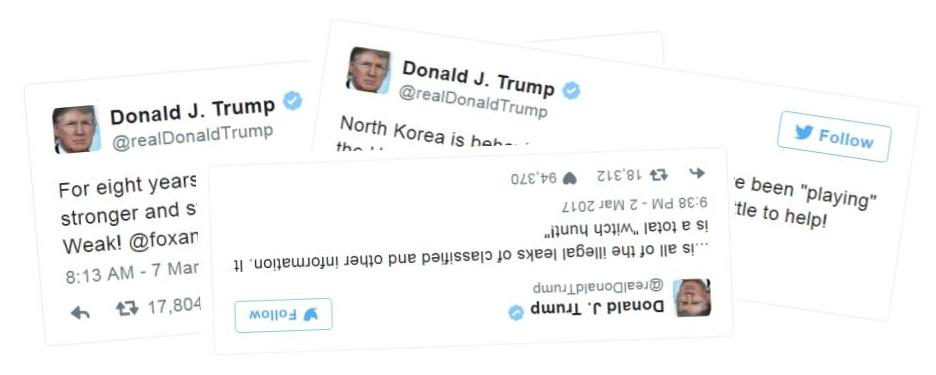The Tweeter-in-Chief's Unpresidential Punctuation: Ignorance or Obfuscation?

Anyone with more than a passing interest in grammar, style, and usage has likely been chided once or a million times to focus on what really matters, because, after all, “You know what I mean!” Sometimes, of course, this is true; a clear typo or simple homophone mix-up, while potentially distracting, is unlikely to truly muddy the waters. As much as we all love to fight about the serial comma, it is rare indeed that its existence or omission actually renders a sentence incomprehensible enough for courts to get involved.
As such, it might seem that harping on the tweeting style of President Trump is merely an ad hominem attack, the last refuge of those who disagree with his politics but are too tired to do anything but take cheap shots. The high-minded thing to do would be to ignore his style to focus on the substance. Except that with Trump, the misuse of language and punctuation seems deliberately intended to obscure any potential substance.
“Now remember this. When I said wiretapping, it was in quotes. Because a wiretapping is, you know today it is different than wire tapping. It is just a good description. But wiretapping was in quotes. What I’m talking about is surveillance,” Trump said in an interview with Time magazine, referring to a series of tweets from March 4 in which he accused President Obama of wiretapping him, a claim that was near-universally disputed.
Indeed, he did use quotation marks (…in two of his four tweets on the subject), but then he’s constantly using gratuitous and incorrect quotation marks:
https://twitter.com/realdonaldtrump/status/839101660886614016
https://twitter.com/realdonaldtrump/status/842724011234791424
https://twitter.com/realdonaldtrump/status/837492425283219458
You basically have to ignore the quotation marks, which appear to be used either for emphasis or to mark slightly slangy words (unnecessarily and incorrectly on both counts) in order for the remarks to make any sense. In fact, sometimes if you don’t ignore the quotation marks, his tweet implies the opposite of what he clearly means:
https://twitter.com/realdonaldtrump/status/835814988686233601
https://twitter.com/realdonaldtrump/status/835104946034991106
So these inappropriate quotation marks are lumped in with his nigh-Germanic capitalization style (“American People,” “Fake News,” “Repeal and Replace”), obvious typos, overuse of all caps, and oddly British habit of putting the titles of articles in single quotes as idiosyncrasies to be ignored, an artifact of his ignorance and/or refusal to employ or heed a copy editor…but then suddenly, chalking the quotation marks around “wiretapping” up to Trump being Trump is grounds for accusations of putting words in his mouth.
Convenient, that.
His habit of underusing commas or having sentence fragments all connected with dashes serves the same obstructing purpose; without the clear structural cues of a properly designed sentence and connectors/punctuation, it’s often incredibly vague. You assume what he’s getting at (in order for it to make any sense at all) and then he’s like “Haha, look who’s reading into everything and misinterpreting everything I say. FAKE NEWS!”
And that’s when he’s actually composing text. His speech is yet more inscrutable, such that transcribers find themselves in the unenviable position of trying to divine what Trump might actually mean in order to render it properly. Where does one sentence end and another begin? Does he return to his original thought after the digression or is he embarking on a new thought? Is this clause related to this other one or is it the start of a new thought (or a new digression)? Decisions on the punctuation of speech always have the potential for shaping its interpretation, but more so with Trump than is usual. It’s rare that a transcriber has to be cautious not to impose too much structure on a speaker’s words for fear of adding in meaning that wasn’t there rather than simply not quite capturing the nuance of what was.
Language matters. Precision matters. Punctuation matters. Consistency matters. It’s too easy to hide behind bad usage and incorrect punctuation and to accuse others of deliberately misinterpreting you or reading into what you’re saying—when they have to because you didn’t just out and say it. Language is how we communicate, and if you make it so people can’t tell what you mean, or if you refuse to allow meaning to be imparted to the language you use, you’re not communicating.
For Trump, this seems to be the goal: if he can only speak vaguely and ambiguously enough, he always has cover when attacked, can claim that others are deliberately manipulating his words, and can even decide what he meant after the fact. It is thus not shallow or petty to focus on how Trump says what he says, as the how is often more the point than the what.

Lauren Hinkle is a copyeditor and erstwhile transcriber who is very relieved not to have to make choices about how to punctuate this president’s speech.
Lauren Hinkle
